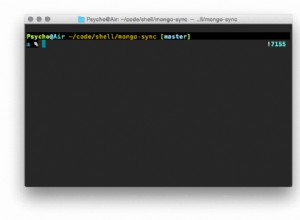"async " est un module très populaire pour supprimer les boucles asynchrones et rendre votre code plus facile à lire/maintenir. Par exemple :
var async = require('async');
function getHonorStudentsFrom(stuObjList, callback) {
var honorStudents = [];
// The 'async.forEach()' function will call 'iteratorFcn' for each element in
// stuObjList, passing a student object as the first param and a callback
// function as the second param. Run the callback to indicate that you're
// done working with the current student object. Anything you pass to done()
// is interpreted as an error. In that scenario, the iterating will stop and
// the error will be passed to the 'doneIteratingFcn' function defined below.
var iteratorFcn = function(stuObj, done) {
// If the current student object doesn't have the 'honor_student' property
// then move on to the next iteration.
if( !stuObj.honor_student ) {
done();
return; // The return statement ensures that no further code in this
// function is executed after the call to done(). This allows
// us to avoid writing an 'else' block.
}
db.collection("students").findOne({'_id' : stuObj._id}, function(err, honorStudent)
{
if(err) {
done(err);
return;
}
honorStudents.push(honorStudent);
done();
return;
});
};
var doneIteratingFcn = function(err) {
// In your 'callback' implementation, check to see if err is null/undefined
// to know if something went wrong.
callback(err, honorStudents);
};
// iteratorFcn will be called for each element in stuObjList.
async.forEach(stuObjList, iteratorFcn, doneIteratingFcn);
}
Vous pouvez donc l'utiliser comme ceci :
getHonorStudentsFrom(studentObjs, function(err, honorStudents) {
if(err) {
// Handle the error
return;
}
// Do something with honroStudents
});
Notez que .forEach() appellera votre fonction d'itérateur pour chaque élément de stuObjList "en parallèle" (c'est-à-dire qu'il n'attendra pas qu'une fonction d'itérateur finisse d'être appelée pour un élément de tableau avant de l'appeler sur l'élément de tableau suivant). Cela signifie que vous ne pouvez pas vraiment prédire l'ordre dans lequel les fonctions de l'itérateur (ou, plus important encore, les appels de la base de données) s'exécuteront. Résultat final:ordre imprévisible des étudiants d'honneur. Si l'ordre est important, utilisez le .forEachSeries() fonction.




